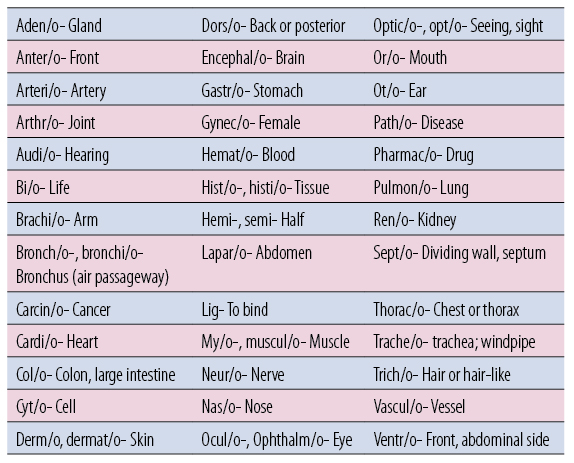Would Taking Medical Terminology Increase The Liklihood Of My Apps

Improve your chances of passing an AAPC coding credential exam with these study aids.
Learning anatomy and pathophysiology (A&P) is difficult but essential for anyone preparing for the Certified Professional Coder (CPC®), Certified Outpatient Coder (COC™), or Certified Inpatient Coder (CIC™) exam.
When studying A&P, you may feel like you are living the idiom "It's all Greek to me." This is because the origins of standard roots, prefixes, and suffixes of today's medical terminology are mostly Greek and Latin derived.
Learning a foreign language is never easy, but there are tricks to the trade. Here are seven tips to help you commit medical terminology to memory and improve your understanding of A&P.
Tip 1: Break It Down
When you understand that most medical terms are derived from Latin or Greek, it's easier to figure out what the words mean by breaking them down. The key is practicing the Latin and Greek root words on your own.
Start by creating flashcards, spreadsheets, or tables with the word parts you want to memorize. Here is just a small sample of common Greek and Latin medical root words:

There are a lot of roots, prefixes, and suffixes to learn, so start with five or six word parts per day to keep it manageable. Write down the root words and practice saying terms that contain them. The more familiar you become with the terms, the better you'll retain them in your long-term memory.
Tip 2: Dive Into Coding and Medical Books
Code books and medical dictionaries are great sources for visually presented information such as illustrations, diagrams, and tables. When you go through your code books, don't just highlight important or tricky words; write them down, draw your own pictures, and create your own medical analogies. For example, imagine what happens to food as it enters the mouth and the bolus moves through the digestive tract; visualize all the body parts, what they are called, and how to spell them.
Tip 3: Repetition Is Your Friend
When it comes to learning, repetition does wonders for memory. When you are stuck on seemingly impossible medical terms, write and rewrite them 10-15 times by hand. Write both the terms and their meanings (in your own words), so the information becomes ingrained in your brain.
Writing by hand is key. According to an article in The Week, "Study after study suggests that handwriting is important for brain development and cognition … On a typewriter or word processor you can rush something that shouldn't be rushed — you can lose nuance, richness, lucidity." Repetitive writing may seem antiquated, but it remains a viable way to retain information.
Tip 4: Explore and Apply How You Learn Best
Memorizing out of a textbook or from information on a screen may not be an ideal way for medical terminology to stay in your brain. If reading and writing down everything doesn't seem to help you learn, you may be a visual, aural, or hands-on (kinesthetic) learner. To get the most out of your study time, you need to figure out your best learning style and alter your study habits accordingly:
- If you are a visual learner, you may learn faster by seeing illustrations and photos or using flashcards.
- If you are an aural learner, listening to instructor lectures or audio recordings about medical terms and pronunciations may be ideal for you.
- If you are a kinesthetic, or tactile, learner, consider attending an anatomy expo, so you can touch and hold mock anatomical parts.
Tip 5: Make Flashcards and Form Study Groups
Flashcards are an effective, cheap study tool for those who learn through visual stimulation and association. They work by creating a visual trigger between terms and definitions. You may be able to purchase pre-made flashcards for medical terminology. If you make them yourself, however, you earn bonus points for memory retention.
Studying with others can be an effective way to learn because you can challenge and help each other. Meet with your group regularly to review the chosen material — and don't forget to bring your flashcards!
Tip 6: Make Memorization Fun With Games
Games can help you learn medical terminology in an exciting way, especially if there are giveaway incentives involved. AAPC local chapter meetings are a great place to play games in a group setting and offer prizes. Some games that work magic on medical term memorization are:
- Jeopardy – Make a Jeopardy board and ask medical terminology questions, or make index cards with categories based on Latin or Greek words or body parts; then, have a set of cards for the descriptions of those medical terms with the answer (in question format) on the back. You can play Jeopardy as individuals or as teams, depending on how many people are involved in
the game. There are Jeopardy templates online at jeopardylabs.com. - Bingo – Have one person read the definitions, while players mark the medical terminology on their boards. The first one to get a correct line of A&P terms calls "Bingo!" and gets a prize.
- Pictionary – Make it a race to draw pictures of human anatomy and then label the parts correctly.
AAPC local chapters provide templated games for learning at www.aapc.com/memberarea/chapters/resources/coding-games.aspx. Tap into them to hone your cognitive skills.
Tip 7: Solidify Your A&P Knowledge Online
AAPC offers online anatomy and medical terminology courses for non-clinical medical professional students who have never studied A&P and for those who want to bolster their knowledge in this area. The courses explain the nuances of the human body and are recommended for anyone who is preparing for an AAPC certification exam. You can find more information about the courses here: Anatomy; Medical Terminology; Pathophysiology.
Learning by Association Helps Members Memorize
Learning medical terminology and spelling the words correctly can be challenging. We asked AAPC members on Facebook what words they had trouble memorizing and how they overcame those difficulties. Many said learning by association worked like a charm. Here are a few examples:
"I had a great med term teacher who was an RN and said to remember 'blephar/o-' by thinking of puppets that have 'blue fur' on their eyelids. As a big Muppets fan, that always stuck with me!" – Victoria Moll, CPC, CPMA, CRC, CPRC, AAPC Approved Instructor, AAPC Fellow
"Ilium vs. Ileum. The one with middle 'i' goes with the middle 'i' in hip." – Claire Bartkewicz, COC
"Anesthesia was so hard for me to say correctly, and I had to remember to just say 'anes' first and then I would say it right!" – Judy A. Wilson, CPC, CPCO, CPC-P, CDEO, COC, CANPC,
CPB, CPPM, CPCP, CMRS, AAPC Approved Instructor
Resources:
Medisave, "5 Creative Ways to Quickly Learn Medical Terminology (And Remember It)": https://blog.medisave.co.uk/5-creative-ways-quickly-learn-medical-terminology/
The Week, "How Writing by Hand Makes Kids Smarter": https://theweek.com/articles/490493/how-writing-by-hand-makes-kids-smarter
Dummies, "10 Study Tips for Anatomy and Physiology Students", Janet Rae-Dupree, Pat DuPree: https://www.dummies.com/education/science/anatomy/10-study-tips-for-anatomy-and-physiology-students/
- Author
- Recent Posts
![]()
Michelle A. Dick, BS, is a freelance content specialist, providing writing, editorial expertise, and graphic imagery to clients. Prior to becoming a free agent, she was an executive editor for AAPC, editor-in-chief at Eli Research, and editor at Element K Journals. After earning a Bachelor of Science from the State University of New York at Buffalo State, Dick entered the publishing industry as a graphic artist, ad coordinator, and web designer for White Directory Publishers, Inc.
![]()
Would Taking Medical Terminology Increase The Liklihood Of My Apps
Source: https://www.aapc.com/blog/51631-7-tips-for-memorizing-medical-terminology/
Posted by: balltorteropaid48.blogspot.com

0 Response to "Would Taking Medical Terminology Increase The Liklihood Of My Apps"
Post a Comment